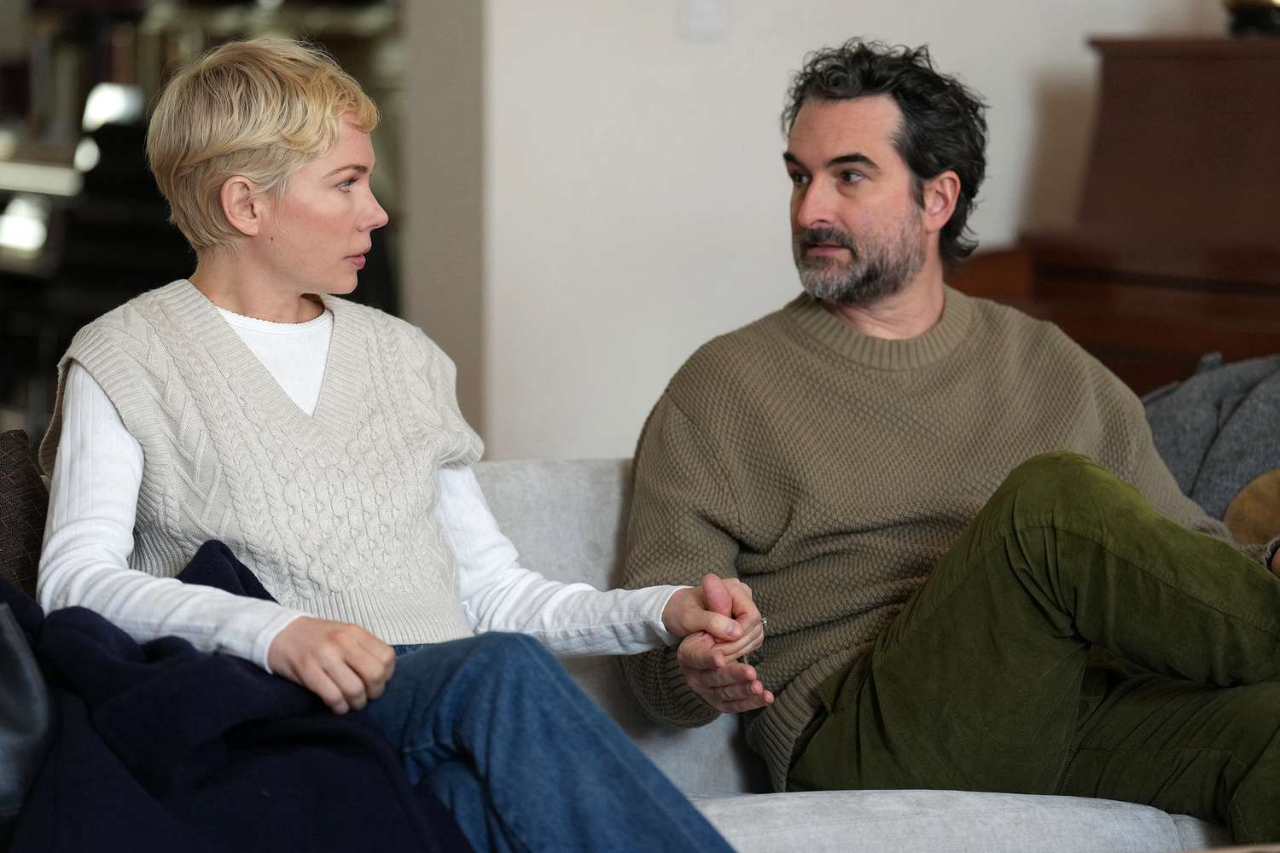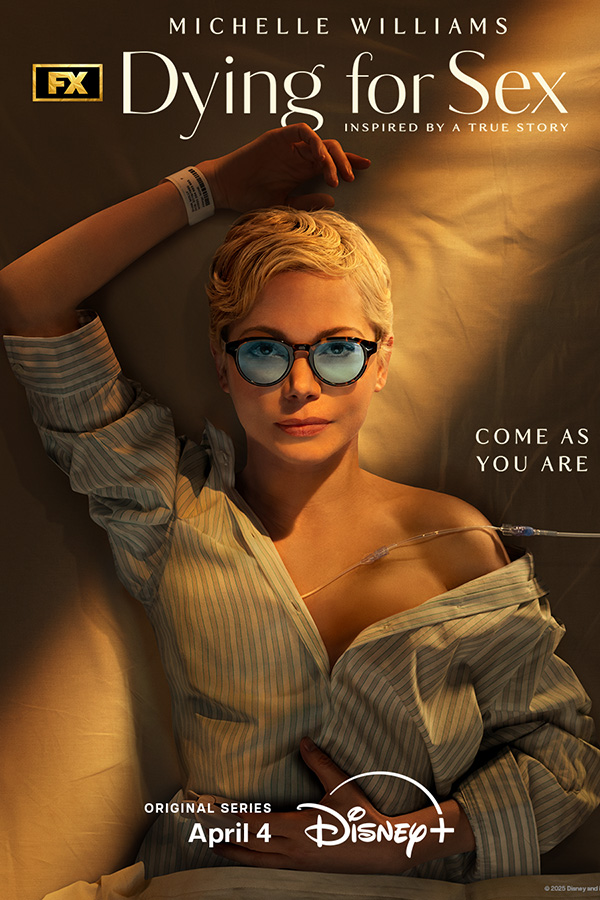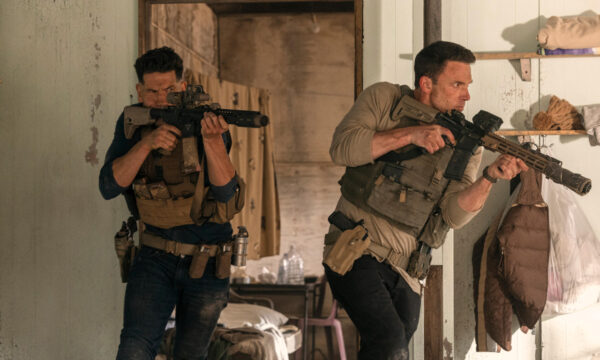“Everybody’s just trying their best”: Jay Duplass on Dying for Sex

Dying for Sex is a bold and poignant exploration of the often-taboo subjects of mortality and sexuality, inspired by the Wondery podcast of the same name. Created by Elizabeth Meriwether and Kim Rosenstock, the limited series expertly balances dark comedy with emotional touches. Michelle Williams gives a raw and vulnerable performance as Molly Kochan, a woman grappling with a terminal Stage IV metastatic breast cancer diagnosis, who embarks on a journey of intimacy and self-discovery in her final months. Supported by her emotionally distant yet dependable ex-husband, Steve (Jay Duplass), and her best friend, Nikki Boyer (Jenny Slate), Molly’s path is both cathartic and freeing.
Ahead of the series’ release, Duplass spoke to The Upcoming about his portrayal of Steve, a character who finds himself caught between supporting his ex-wife and confronting his own emotional shortcomings. Duplass discusses his personal inspiration for the role, his thoughts on the show’s exploration of mortality, and his collaboration with Michelle Williams, whose portrayal of Molly offers a nuanced perspective on facing death. He also reflects on how Dying for Sex aims to spark important conversations around the treatment of dying in culture, and why these difficult topics need to be addressed with both humour and sensitivity.
Hi Jay, it’s so lovely to speak with you today. To start things off, could you tell us a little about Steve, your character in Dying for Sex?
Steve is Molly’s husband, who is very proud of his ability and his success at being sort of like the “Health Manager” of her previous cancer adventure, and basically, due to his strictness and protocols, moving her very safely into remission previously. So he loves Molly, wants to do a really good job and has done it before, and is very bullish about his leadership abilities in terms of helping somebody deal with cancer.
What were your initial impressions of Steve as a character and his relationship with Molly, and did they change over time?
My initial impressions were that he’s funny in terms of how controlling he can be and how fixated he gets about dealing with Molly’s cancer, and that, while he’s trying to help, he’s kind of the antagonist, you know? He’s the antagonist in terms of at least Molly being able to experience the last part of her life the way that she wants to experience it. I would say that over time, I felt a lot more for Steve in terms of how much he loves his wife, and how much he wants to keep her alive. So, as much as he’s semi-comedic and a bit of an antagonist, his heart is in the right place; he just doesn’t know how to do it well.
Did the Dying for Sex podcast inform your portrayal of Steve?
I actually have not listened to the Dying For Sex podcast. I had heard about it, and a lot of people that I’m friends with had listened to it and were huge fans of it. It was on my radar when I got offered this part, and then I actually decided to not listen to it. I know that that’s somewhat controversial sometimes, but when I read the scripts that Liz and Kim had sent over, I was so impressed, and I felt like I knew exactly what they wanted and exactly the world that they were trying to build. And sometimes, when you’re portraying real people in real life and the scripts are different from that person, it can get a little bit confusing. The writing was so good that I thought it would be just best for me to stay very, very singular and focused on this narrow corridor of the television show that they were trying to make. And, of course, I asked little questions along the way. And Nikki Boyer, who is so deeply creatively involved in the show, was there every day, so we would have conversations, and I would check in with her. But ultimately, what was clear is that I wasn’t playing an exact version of this real person and that it was more important for me to portray the version of him in the script very accurately. So that’s the path that I chose.
What kind of research or behind-the-scenes work did you do to prepare for this role?
I had a friend – I mean, this was a pretty sad story – but when I was in college, I had a friend whose best friend was dying of cancer, and he was my friend, and was very much involved in the day-to-day caretaking of this person. He was counting the meds and making sure that the nurses were arriving on time. And, long story short, a nurse made a mistake, and his friend died. And it was a huge, life-defining moment for my friend. He felt responsible for a while. And he knew that it’s an imperfect practice – people make mistakes, people forget things. I sort of drew upon that connection and the stories that he told me to understand Steve’s desperation to control everything because it is a matter of life and death. So that was the main experience that I drew upon.
What was the most challenging scene for you to film, and why?
I would say the botched blowjob sex scene was the hardest to film, just because sex scenes are always challenging – they are choreographed like stunt scenes. So it was a very choreographed, controlled scene where it was very hard to get the cameras where they needed to be, to show the stuff that needed to be seen and not show the stuff that we didn’t want to show. And at the same time, it was my biggest emotional moment that I was having on the entire show. So it was like having my most profound, most vulnerable, biggest moment in the middle of the most controlled environment, but I got through it with Michelle’s help. She was totally there for me. So it was tough, but it was great at the same time.
What drew you to this project in the first place?
They told me it was a comedy about dying and sex and that Liz and Kim were the showrunners, and that Michelle Williams was the lead, and they wanted me to be her husband, and I was like, ‘I’m in.” And then everything that I experienced subsequent to that just only added to what I felt was the importance of the project or just the fact that it was inspired and timely and it means something. We live in a time where a lot of content is just just that – it’s content, it’s just filler entertainment. And this is something that I felt could really help people deal with the things that we all deal with: we’re all going to die, and to deal with it in a way where you can bring some levity and some joy and some light and some love and some comedy to it. Just seems like an incredible opportunity.
How did you and Michelle Williams work together to portray the complexities of Steve and Molly’s relationship?
I had met Michelle once before briefly, but I didn’t know her. I think you could say it’s lucky, but I think it’s probably just natural casting ability from Liz and Kim. I think Michelle and I work in very similar ways. We don’t like to talk about stuff a lot. We don’t necessarily need to rehearse stuff a lot. We come fully prepared and dropped in and it felt very natural, and I felt really lucky about it, because she’s a huge movie star and she could do anything that she wanted to do on that set, but she was just incredibly dropped in, incredibly connected and incredibly generous, considering we were all really processing quite a bit, both as humans and as actors.
What kind of conversations do you hope their relationship will spark among viewers?
I think there are so many conversations that need to be had. It is cultural, especially in America. It’s a very adolescent culture that we live in over here, and people are afraid of death and dying. And everything in life is scary, but the idea that death and dying is a thing to do, and it can be a beautiful process and something that can be shared, and the dignity of the person and the will of the person who’s dying is the most important thing. My wife’s a social worker and has done hospice work. And people really don’t want to look at it, but it’s actually nothing to be afraid of. It can be right up there with birth as one of the most beautiful transitions in life. So I think there’s just so much that this show can share with the world, and the fact that it does it with humour and adventure makes it even more bold and fun and true.
What do you hope people will understand about Steve’s perspective by the end of the series?
By the end of the series, everybody’s just trying their best, even the bad actors in the world – I do believe they are actually trying their best.
Do you believe a miniseries was the most effective way to tell this story, compared to other formats?
Well, I think the obvious one is why it’s not an ongoing television show that Molly dies; I don’t know if we want to print that, but I would say that I think there’s a lot more material than a movie. There is a really big world and a lot of characters, and there are so many fun things to explore. So, I agree that the limited series is just the right amount to share. And I love that format; I think it’s essentially like a long-form movie with a beginning, a middle and an end. And I think I’m really thrilled with how it came out.
How do you feel about this project, not just from an actor’s perspective but also from the standpoints of a director, producer and writer?
I’m just so proud of it. I think it’s just such a big swing. A lot of people play defence, AND a lot of people just get quick laughs. But this is a show that goes as deep as any show has ever tried to go, and they’re trying to make it fun and funny, too. And I think they achieved it. I think it’s just a very impressive achievement, and I feel lucky to be a part of it.
Finally, what was your reaction to seeing the finished show?
Tears and laughter, and just sort of renewed; that we’ve got this one life, and you have to live it. It was very life-affirming.
Christina Yang
Dying for Sex is released on Disney+ on 4th April 2025. Read our review here.
Watch the trailer for Dying for Sex here:

























Facebook
Twitter
Instagram
YouTube
RSS